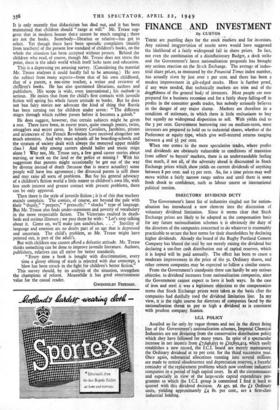FINANCE AND INVESTMENT
By CUSTOS
THESE are puzzling days for the stock markets and for investors. Any rational interpretation of recent news would have suggested the likelihood of a fairly widespread fall in share prices. In fact, not even the combination of a disinflationary Budget, a dock strike and the Government's latest nationalisation proposals has brought any serious reaction on the Stock Exchange. The average of indus- trial share pri,:es, as measured by the Financial Times index number, has actually risen by just over I per cent. and there has been a modest improvement in gilt-edged stocks. Here is further proof, if any were needed, that technically markets are trim and of the doggtdness of the general body of investors. Most people ?re now prepared for a business recession and for a fairly sharp falling-off in profits in the consumer goods trades, but nobody seriously believes in the danger of any major slump. Markets are therefore in- a condition of stalemate, in which there is little enthusiasm to buy but equally no widespread disposition to sell. With yields tied to the 3 per cent. Government borrowing rate on medium-term, most investors are prepared to hold on to industrial shares, whether of the Preference or equity type, which give well-secured returns ranging between 4 and 5f per cent.
When one comes to the more speculative trades, where profits and dividends are obviously vulnerable to conditions of transition from sellers' to buyers' markets, there is an understandable feeling that much, if not all, of the adversity ahead is discounted in Stock Exchange prices which. show yields on current dividends of anything between 8 per cent. and 15 per cent. So, for 3 time prices may well move within a fairly narrow range unless and until there is some fresh shock to confidence, such as labour unrest or international political tension.
DIRECTORS' DIVIDEND DUTY
The Government's latest list of industries singled out for nation- alisation has introduced a new element into the discussion of voluntary dividend limitation. Since it seems clear that Stock Exchange prices are likely to be adopted as the compensation basis for any future nationalisation schemes it is obviously the duty of the directors of the companies concerned to do whatever is reasonably practicable to secure the best terms for their shareholders by declaring higher dividends. Already the board of the Rugby Portland Cement Company has blazed the trail by not merely raising the dividend but declaring a tax-free cash distribution out of capital reserves, which it is hoped will be paid annually. The effect has been to cause a moderate improvement in the price of the 5s. Ordinary shares, and other cement companies may be expected to follow a similar course.
From the Government's standpoint there can hardly be any serious objectioi_ to dividend increases from nationalisation companies, since the Government cannot expect to have it both ways. In the case of iron and steel it was a legitimate objection to the compensation terms that Stock Eichange prices were taken as the basis Etter the companies had dutifully toed the dividend limitation line. In my view, it is the right course for directors of companies faced by the nationalisation threat to pay as high a dividend as is consistent with prudent company finance.
I.C.I. POLICY
Assailed so far only by vague threats and not in the direct firing line of the Government's nationalisation schemes, Imperial Chemical Industries are not deviating from the conservative distribution policy which they have followed for many years. In spite of a spectacular increase in net income from £7,646,933 to £10,850,414, which easily establishes a new record, the I.C.I. board are merely maintaining the Ordinary dividend at io per cent. for the third successive year. Once again, substantial allocations running into several millions are made to central obsolescence and depreciation reserves, a forceful reminder of the replacement problems which now confront industrial companies in a period of high capital costs. In all the circumstances and especially in view of the large-scale capital expenditure pro- gramme to which the I.C.I. group is committed I find it hard to quarrel with this dividend decision. At 45s. 9d. the £x Ordinary units, yielding approximately £4 8s. per cent., are a first-class industrial holding.


































 Previous page
Previous page